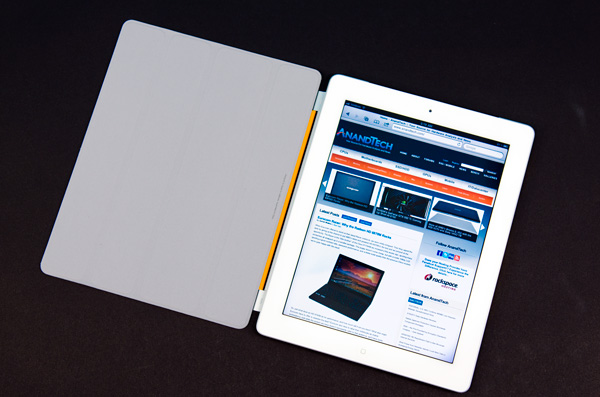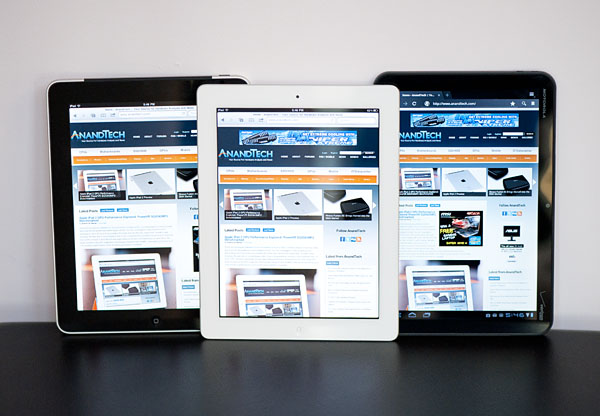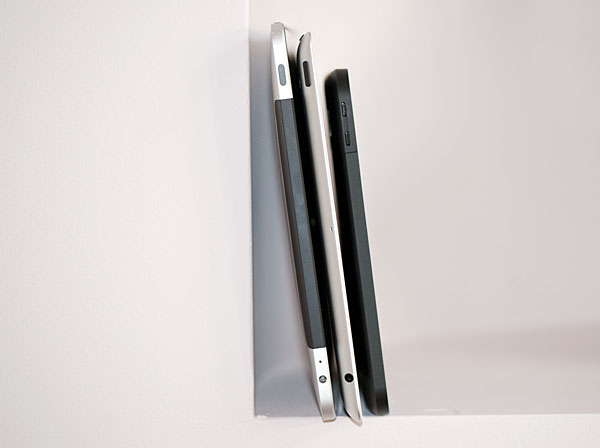The Apple iPad 2 Review
by Brian Klug, Anand Lal Shimpi & Vivek Gowri on March 19, 2011 8:01 PM ESTFinal Words
If you fell in love with the original iPad, the iPad 2 is a significant upgrade. You get much faster hardware, a much more ergonomic device and the ability to FaceTime with your friends. If it weren't for the fact that the iPad 3 is likely 12 months away with another set of similarly impressive upgrades I'd recommend all iPad users upgrade to the 2nd generation model.
I find that with Apple products you have to pick an upgrade cadence and firmly stick to it. In the Mac world it's difficult but not too hard to stick to. Upgrading yearly never makes financial sense so usually putting yourself on a 2 - 3 year cycle for the biggest upgraders usually works. Apple hardware tends to hold its value surprising well so as long as you do a good job of reselling your old stuff, this cadence can work well if you absolutely must have the latest and greatest.
The iOS platforms are a bit more difficult to be patient with. As you can see by the SoC upgrades Apple has thrown into the iPad 2, for the next couple of years you should expect Apple to be upgrading at a rate faster than Moore's Law. Eventually this will level off but for the iPad 2, iPad 3 and probably even the iPad 4 we'll see this sort of aggressive ramp in hardware capabilities. You really have to treat the iPad like a smartphone - it's going to be made significantly less desirable in about 12 months so plan your purchasing accordingly.
Cautious purchasing brings me to my biggest complaint about the iPad 2 - its pricing. Motorola gets a bad rap for pricing the first Xoom at $799, but there's only one iPad 2 that sells at $499. Buy a case, pick one of the higher capacity models, add 3G and you're quickly paying a lot more for the iPad 2 than you would a mainstream PC. Granted Apple doesn't make as much off of the iPad as it does other members of its product lineup, but I still feel the price is too much for a device that can only augment your existing computing devices.
I do wish Apple was able to increase display resolution on the iPad 2, although I suspect that combined with the SoC improvements that may have been a little too much for this generation. It's clear that a higher resolution panel is coming as Apple finally has an OS that properly handles DPI scaling. The real question is when, and is that time soon enough that you can hold off buying an iPad until then?
There's no better place to say this so I'll just put it out there: Apple's commitment to increasing performance deserves serious recognition. Whether or not you like the company, Apple outfitted the iPad 2 with a pair of ARM Cortex A9s and a GPU significantly faster than anything else on the market. Look around and you won't see many apps that can really stress the PowerVR SGX 543MP2 that Apple put in the A5. Make no mistake, this is about building a big install base of high performance mobile devices. Apple is eager to win the hearts of game developers with the A5. Gaming will be an important part of the tablet's evolution and Apple clearly understands that. What happens when your tablet is fast enough to run Halo? Performance matters here, maybe not as much today, but when the entire install base has PowerVR SGX 543MP2s at the bare minimum things will get really interesting.
Apple's fat trimming really improved the iPad 2's ergonomics, and the smart covers only helped improve things. While I wouldn't consider porting the original iPad around due to its limited usefulness in my workflow, the iPad 2 is thin and light enough where I'm less bothered by it. Ultimately I feel like tablets (iPad or not) have to be even thinner and even more ergonomic to really come into their own. The good news is that Apple hasn't done anything too exotic in slimming down the original iPad. I'd expect the second generation of Android tablets to be similarly thin/light.
And that brings us to the controversy, the Honeycomb comparison. The Xoom is the only real competition shipping for the iPad 2 today, but within 60 days we'll likely have competitors from ASUS and Samsung on the market as well. Honeycomb has some serious advantages in the feature department. Multitasking is better under Android 3.0, as are notifications and as of yesterday there's finally Flash support. Apple still provides a smoother UI than Honeycomb, however this time around I'm wondering how much of that might be due to the GPU horsepower behind Tegra 2. While Tegra 2 does well on a lower resolution screen, I feel like it is underpowered to deal with the Xoom's 1280 x 800 display.
Hardware-wise Apple has an ergonomics advantage over the Xoom. While I like holding the Xoom more than the original iPad, I prefer the iPad 2's feel to the Xoom. The Xoom has the edge in camera quality and display resolution, while the iPad 2 has a better looking display and a faster GPU. I still fundamentally believe that web browsing and email are the killer apps for tablets and as such I don't put too much weight in Apple's iPad app advantage. Long term I believe that the most important apps will be available on both platforms, so unless there's an app that you want today that's an iOS exclusive I wouldn't lose sleep over it.
So if you're actually torn between the iPad 2 and the Xoom my best advice is to wait. Apple needs to update iOS in a major way and Honeycomb needs a hardware update. Whichever gets it right first should get your money.
If you don't fall into the borderline camp then the decision is pretty simple. If you need a tablet that runs iOS today, the iPad 2 is great. If you're not sure, you should wait. Tablets are still a couple of generations from being really amazing. Everything between now and then are just steps along the way.














189 Comments
View All Comments
JarredWalton - Sunday, March 20, 2011 - link
Considering the source (ARMflix), you need to take that video with a huge grain of salt. It looks like they're running some Linux variant on the two systems (maybe Chromium?), and while the build may be the same, that doesn't mean it's optimized equally well for Atom vs. A9.Single-core Atom at 1.6GHz vs. dual-core A9 at 500MHz surfing the web is fine and all, but when we discuss Atom being faster than A9 we're talking about raw performance potential. A properly optimized web browser and OS experience with high-speed Internet should be good on just about any modern platform. Throw in some video playback as well, give us something more than a script of web pages in a browser, etc.
Now, none of this means ARM's A9 is bad, but to show that it's as fast as Atom when browsing some web pages is potentially meaningless. What we really need to know is what one platform can do well that the other can't handle properly. Where does A9 fall flat? Where does Atom stumble?
For me, right now, Atom sucks at anything video related. Sorry, but YouTube and Hulu are pretty important tools for me. That also means iOS has some concerns, as it doesn't support Flash at all, and there are enough places where Flash is still used that it creates issues. Luckily, I have plenty of other devices for accessing the web. In the end, I mostly play Angry Birds on my iPod Touch while I'm waiting for someone. :-)
Wilco1 - Sunday, March 20, 2011 - link
The article is indeed wrong to suggest that the A9 has only half the performance of an Atom. There are cases where a netbook with a single core Atom might be faster, for example if it runs at a much higher frequency, uses hyperthreading, and has a fast DDR3 memory system. However in terms of raw CPU performance the out-of-order A9 is significantly faster than the in-order Atom. Benchmark results such as CoreMark confirm this, a single core Atom cannot beat an A9 at the same frequency - even with hyperthreading. So it would be good to clarify that netbooks are faster because they use higher frequency CPUs and a faster memory system - as well as a larger battery...somata - Sunday, March 27, 2011 - link
CoreMark is nearly as meaningless as MIPS. Right now the best cross-platform benchmark we have is Geekbench. It uses portable, multi-threaded, native code to perform real tasks. My experience with Geekbench on the Mac/PC over the years indicates that Geekbench scores correlate pretty well to average application performance (determined by my personal suite of app benchmarks). Of course there will be outliers, but Geekbench does a pretty good job at representing typical code.Given that, the fact that a single-core 1.6GHz Atom (with HT) scores about 28% higher than the IPad's dual-core 1GHz A9s in the integer suite leaves me little doubt that the Atom, despite being in-order, has as good or better per-clock performance than the A9s.
Even the oft-maligned PowerPC G4 totally outclasses the dual A9s, with 43% better integer performance at 1.42GHz... and that's just with a single core competing against two!
tcool93 - Sunday, March 20, 2011 - link
Tablets do have their advantages despite what the article claims. For one thing, their battery life far out lives any Netbook or Notebook. They also run a lot cooler, unlike Notebooks and Netbooks, which you can fry an egg on. Maybe they aren't as portable as a phone, but who wants to look at the super tiny print on a phone.Tablets don't replace computers, and never will. There are nice to sit in bed with at night and browse the web or read books on, or play a simple game on. Anything that doesn't require a lot of typing.
Even a 10" tablet screen isn't real big to read text, but its MUCH easier to zoom in on text to read it with tablets. Unlike any Notebook/'Netbook, which its a huge pain to get to zoom in.
tcool93 - Sunday, March 20, 2011 - link
I do think the benchmarks shown here do show that there is quite an improvement over the Ipad 1, despite what many seem to claim that there isn't much of an upgrade.secretmanofagent - Sunday, March 20, 2011 - link
Anand,Appreciate the article, and appreciating that you're responding to the readers as well. All three of you said that it didn't integrate into your workflow, and I have a similar problem (which has prevented me from purchasing one). One thing I'm very curious about: What is your opinion on what would have been the Courier concept? Do you feel that is the direction that tablets should have taken, or do you think that Apple's refining as opposed to paradigming is the way to go?
VivekGowri - Sunday, March 20, 2011 - link
I still despise Microsoft for killing the Courier project. Honestly, I'd have loved to see the tablet market go that direction - a lot more focused on content creation instead of a very consumption-centric device like the iPad. A $4-500 device running that UI, an ARM processor, and OneNote syncing ability would have sold like hotcakes to students. If only...tipoo - Sunday, March 20, 2011 - link
Me too, the Courier looked amazing. They cancel that, yet go ahead with something like the Kin? Hard to imagine where their heads are at.Anand Lal Shimpi - Monday, March 21, 2011 - link
While I've seen the Courier video, and it definitely looked impressive, it's tough to say how that would've worked in practice.I feel like there are performance limitations that are at work here. Even though a pair of A9s are quick, they are by no means fast enough. I feel like as a result, evolutionary refinement is the only way to go about getting to where we need to be. Along the way Apple (and its competitors) can pick up early adopters to help fund the progress.
I'm really curious to see which company gets the gaming side of it down. Clearly that's a huge market.
Take care,
Anand
Azethoth - Monday, March 21, 2011 - link
Gaming side is a good question. Apple will have an advantage there due to limited hardware specs to code to. They are a lot more like a traditional console that way vs Android which will be anything but.Are actual game controls like in the psp phone necessary?
I am also curious what additional UI tech will eventually make it to the pad space:
* Speech, although it is forever not there yet.
* 3D maybe if its not a fad (glasses free)
* Some form of the Kinect maybe to manipulate the 3d stuff and do magical kinect gestures and incantations we haven't dreamed up yet.
* Haptic as mentioned earlier in the thread.
Speech could make a pad suitable for hip bloggers like the AnandTech posse.